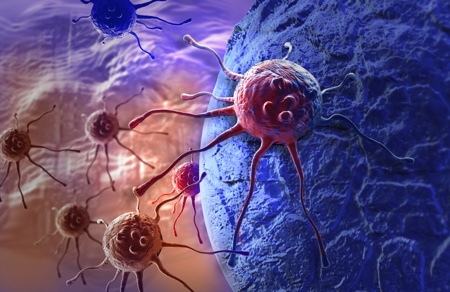There is evidence that vascular endothelial growth factor inhibitors might improve responses by changing the immunosuppressive tumour microenvironment into one that is responsive to the immune system.
Akeso has developed a bispecific antibody, ivonescimab, which combines the two mechanisms of action to target both PD-1 and VEGF-A. It is being developed for a variety of cancers, including non-small cell lung (NSCLC), breast, liver and gastric tumours.
In a Phase Ib study, 108 patients with advanced immunotherapy naïve advanced or metastatic NSCLC were given intravenous doses of 10, 20 or 30 mg/kg of the antibody every 3 weeks, or 20 mg/kg every 2 weeks, as first or second line monotherapy.1
The overall response rate throughout all patients was 39.8% and the disease control rate 86.1%. In the 67 PD-L1 positive patients receiving first-line ivonescimab, the objective response rate was 33.3%, 60.0% and 75.0% for the 3-weekly regimens, and 52.6% for the 2-weekly dose.

Grade 3 or greater treatment-emergent adverse events occurred in 24 patients; these led to discontinuation in one patient and to death for three with squamous NSCLC.
Overall, it was found to have promising efficacy while being well tolerated. A double-blind, placebo-controlled Phase III trial has been done in patients with NSCLC (in combination with chemotherapy).2
In all, 322 NSCLC patients whose disease had progressed despite EGFR therapy were given ivonescimab or a placebo plus pemetrexed and carboplatin once every 3 weeks for four cycles.
This was followed by maintenance therapy of pemetrexed plus either the antibody or the placebo. Results of the first interim analysis reported a median progression-free survival of 7.1 months with ivonescimab and 4.8 months with the placebo.
Grade 3 or higher treatment-emergent adverse events occurred in 99 patients with the antibody and 79 with the placebo, with those related to chemotherapy being the most common.
Preliminary results of a Phase III trial comparing ivonescimab with pembrolizumab as first-line monotherapy in advanced PD-L1 positive NSCLC have been released.3
Progression-free survival was 11.1 months with ivonescimab and 5.8 months with pembrolizumab, and the respective objective response rates were 50.0% and 38.5%.
It also showed significantly better clinical benefits in refractory patient populations, including those with metastases in the brain and liver.
The safety profile was acceptable and manageable. Overall survival data were not mature at the time of data cut-off. It has now been approved in China to treat EGFR mutated locally advanced or metastatic non-squamous NSCLC patients who have progressed after EGFR TKI treatment. Trials continue.
References
- L. Wang, et al., J. Thorac. Oncol. 19, 465 (2024).
- W. Fang, et al., JAMA 332, 561 (2024).
- C. Zhou, et al., 2024 World Conference on Lung Cancer (2–10 September, San Diego, CA, US), Abstr. PL02.04.
